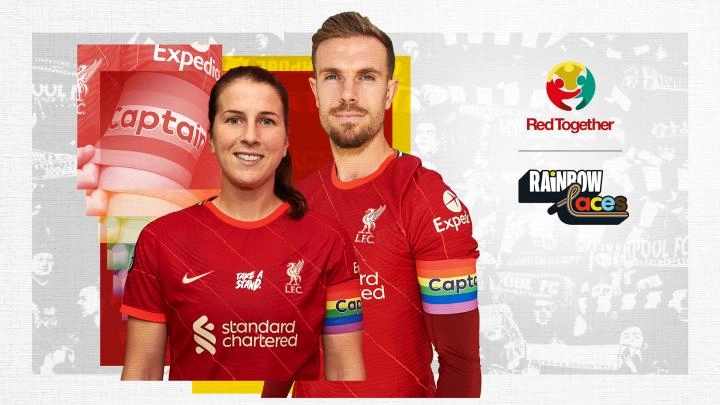Programme notesJordan Henderson voices support for Rainbow Laces campaign
It’s a question I’ve been asked in media interviews on a number of occasions; why are there no openly gay footballers in the men’s professional game in England?
It’s also a question I’ve never really had an answer to, not a good one anyway. The best I can come up with is that I have no idea. That’s truthful, but to be honest I always feel a little ashamed that I don’t have a better explanation.
Today English football shows its solidarity towards the LGBT+ community by backing the Rainbow Laces campaign, in conjunction with Stonewall.
The campaign is something that has grown each season since it was first introduced. I can only really speak for myself when I say that it has made an impact in raising my own awareness on the subject. Each season when it comes around it makes me stop and think about how much further football in particular needs to go before the game can consider itself properly inclusive.
Be it those who play or people who come to support, you don’t have to look very far to see that there is a lot more the game can do, in this country, to be more welcoming.
I’ve seen myself described as an ‘ally’ for the community who are striving to feel more included, but to be honest I don’t think that’s an accolade I’ve earned. That isn’t false modesty, it’s me being truthful. Because I don’t feel I’ve done anything out of the ordinary or worthy of it.
My view on this is very much the same as on any other form of discrimination in the game, whether it relates to race, religious intolerance, disability or any other. I have never personally experienced any of these injustices in my life until now, so I can never and would never claim to have an understanding like those who suffer from the ignorance of others.
But I do believe when you see something that is clearly wrong and makes another human being feel excluded you should stand shoulder-to-shoulder with them. You also have a responsibility to educate yourself better around the challenges they experience.
That’s where my own position on homophobia in football is rooted. Before I’m a footballer, I’m a parent, a husband, a son, a brother and a friend to the people in my life who matter so much to me. The idea that any of them would feel excluded from playing or attending a football match, simply for being and identifying as who they are, blows my mind.
The idea they’d have to hide from it to be accepted? But that’s exactly how too many members of the LGBT+ community feel. We know this because they tell us. So we should listen, support them and work to make it better.
I mentioned earlier that when asked about why there are no openly gay footballers in the men’s professional game in England I usually say I don’t have an answer to that. The other point I often make – and I hear other players and managers say this also – is the one place where there would be absolutely no issue at all is in the team dressing room and internal team environment. I absolutely stand by this.
The modern-day football environment, from my experience, is open and inclusive. It is welcoming. I’ve always believed in our dressing room you are judged on one very simple measure: your abilities as a player.
I also realise that saying this, when there are currently no openly gay players in the English men’s game, might ring a little hollow.
But change comes about when people make brave decisions and that’s why what we saw with Josh Cavallo in Australia was so inspirational.
The fact that speaking out simply to say you are who you are is considered brave in itself highlights the problem football still has to overcome. But it’s a start.
To my earlier point of football-team environments being inclusive, the reaction within the game globally to Josh’s statement spoke volumes. Football celebrated this news and rightly so.
The game still has a long road to travel on this and we all have a part to play. Here at LFC we have seen this season that members of our own supporter base were made to feel unwelcome because some of our fans sang a historical chant which is homophobic. We know this because they had the courage to tell us.
I still remember the statement made by Paul Amann, founder of Kop Outs, when speaking to Jürgen about it. He said it made him feel like a bucket of cold water had been poured over him, like You’ll Never Walk Alone meant nothing.
I’ve since heard that raising awareness around this issue has meant when some fans have tried to sing or shout something homophobic at a game, other supporters now intervene and tell them it’s wrong. That’s how we progress. By showing that level of solidarity and by drawing a line.
I’ve said already I don’t feel worthy of being classed as an ally on this subject, but I am incredibly proud to be regarded as one. Improving knowledge and understanding is important.
That’s why the Rainbow Laces campaign is important – not least on our club’s own Community Day – because it gives space for those who do have a proper understanding to help us all learn.
Gallery51 training photos from Liverpool's Friday session in the rain
AcademyPreston v Liverpool: Youth Cup fixture details confirmed
NewsPremier League announces dates for 2025-26 season
NewsLiverpool's injury list, suspensions and availability
Round-upArne Slot press conference: Southampton challenge, Konate form, Elliott return and more
